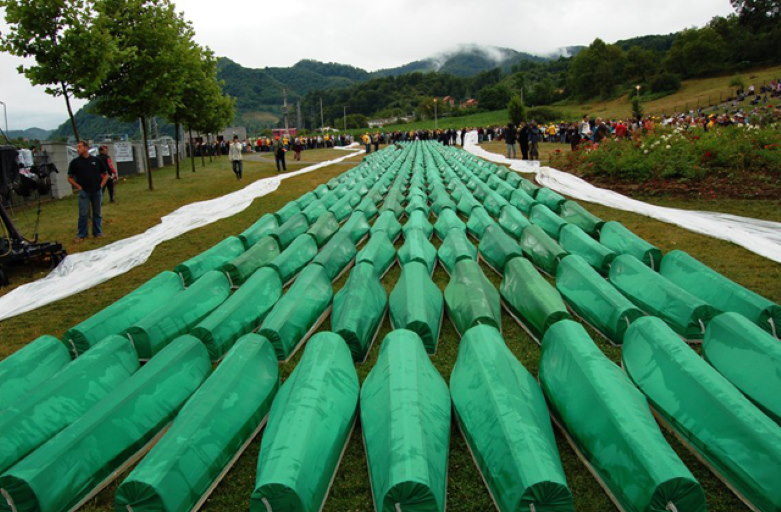On 11 July 1995, after three years of siege, fanatical Serbs stormed the Bosnian town of Srebrenica and murdered about eight thousand boys and men in the following days.
The UN safe zone, where countless people had taken refuge, was handed over without a fight by the UN observers to the Serbs, who segregated their prisoners according to their sex: Women and children were taken away in buses and released into no man’s land between the fronts. Men were executed and buried. UN observers participated in the unlawful deportation of more than three hundred men, well aware of what was in store for them.
Two years before this massacre, the UN had already evacuated women, children, the elderly and the sick from the besieged city, while denying men access to the rescuing convoys, even though everyone knew the men were particularly vulnerable, and even though the stated goal was to provide assistance „based on an assessment of need, vulnerability and the risk to which civilians are exposed“.
Four years after the fall of Srebrenica, the UN decided, notwithstanding all these experiences, that „civilians, especially women and children, have a right to humanitarian assistance“.
At the time, the media downplayed male victims, as is usual in such cases; Usually by not mentioning them at all, and when they absolutely could not avoid it, then by omitting their sex and speaking of „people“ or „victims“. Or with the help of sentences like this one about the excavation of the bodies of 251 people killed at that time: „The majority [of the victims], including 12 women and 5 children, were executed by Bosnian Serb troops“. After all, the 93 percent who were murdered men do not merit a separate mention. As political scientist Adam Jones, co-founder of Gendercide Watch, rightly states: the phrase „including women“ means nothing else than the exclusion of men.
Srebrenica is everywhere
The incidents around Srebrenica are not an exception, but a widespread reality in a world that denies men and boys even the simplest compassion. Social media reactions like #killAllMen or „I bathe in male tears“ are an everyday expression of this. While black lives matter (#BlackLivesMatter), men’s lives are meaningless. #BringBackOurGirls triggers worldwide solidarity, but no one cares about boys who are abducted, abused or exploited as child soldiers.
International aid organisations like UNICEF take it for granted that children in refugee situations have to be evacuated with their mothers, while their fathers apparently play no role. This is despite the fact that it is well known that the safety of fathers and husbands also benefits their wives and children: „If you want to help women, help men,“ is how anthropologist Barbara Harrell-Bond sums up this fact.
Source: R. Charli Carpenter: „Innocent Women and Children“ (Ashgate Publishing Limited, Hampshire/GB and Burlington/USA 2006).
Further information:
http://adamjones.freeservers.com/effacing.htm (archive)
http://genderama.blogspot.de/2015/07/zwanzig-jahre-srebrenica-massenmord.html
http://www.spiegel.de/thema/massaker_von_srebrenica/
http://www.bpb.de/politik/hintergrund-aktuell/209414/das-massaker-von-srebrenica
https://www.zeit.de/2005/28/Srebrenica_Head/komplettansicht
https://www.europa.clio-online.de/essay/id/artikel-3730
https://www.boell.de/de/2015/06/08/srebrenica-erinnerungen-fuer-die-zukunft
http://www.grunerjahrzehnte.de/textedieunsbewegen-srebrenica.html
http://orf.at/stories/2238153/2238154/
https://en.wikipedia.org/wiki/Srebrenica_massacre
Bild: commons.wikimedia von Pyramid~commonswiki, Srebrenica2007

